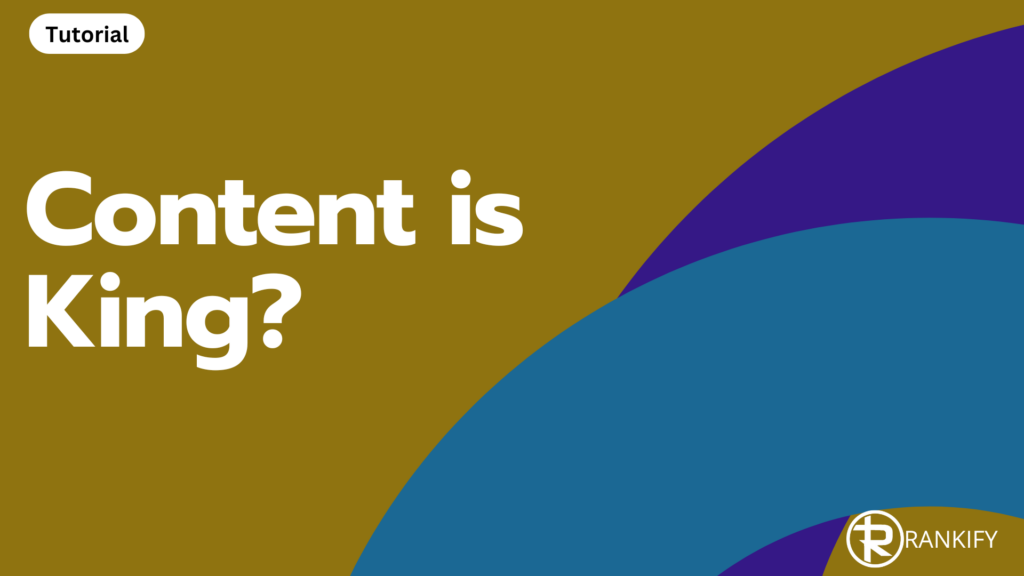Sigh…
The world of Internet marketing is full of slogans, and one of the most often hear is this: Content is King. And what they actually mean to say is still a bit of a mystery to me! Because what they mean and what actually happens in the search results are 2 completely different things! Content is not king!
Many marketing agencies are looking for an SEO specialist who can write good SEO texts.. whatever that means. Are they looking for well-written content? Are they looking for content that converts? Are they looking for poems? And why does this guarantee a top ranking on Google?
The answer is not…
As an SEO specialist, I’ve come to realize that everyone talks about content being king, but they don’t know why something ranks or doesn’t. Google doesn’t like great written content, without spelling errors. There’s more to it than that.
3 Important SEO signals
There are three main components of SEO: external signals, the content itself, and users.
A long time ago, external signals used to be focused on the number of backlinks pointing to a website. However, these days, it’s more important to have the right amount of signals, from different kinds of sources. It’s important that backlinks are based on Branding as well as relevancy, instead of just quantity.
When it comes to website visitors, user intent needs to match the content you have. If people visit your webpage, it should clearly match the search query. If this matches, and the visitor does not return to the search results, you just sent Google a positive signal. Writing content that matches the search query is better than just writing ‘good content’. So, saying: content is King does not mean anything, unless you unravel that.
What’s the problem?
The great frustration unravels
Why do people think this works? Answer: Because they are on page 1 with their beautiful text about” How to make the tastiest green strawberry cake. Search volume: 0
They wan to impress their clients
Are you also curious about what good SEO content is?
Suppose you want a new website and you come across a well-known web development agency who “also do SEO”. Great, you think, I have to have that because I want to get highin Google, and if they build websites and put me at the top, that’s killing two birds with one stone. Even if it costs me thousands of dollars each month.
But is that really SEO?
I frequently say that Google is nothing more than a large calculator. It adds some things up, does some multiplications, and ranks pages based on the total score. That’s it!
To keep it simple, we talk about 3 things: the page, the visitor and the signals from outside the website. (You can think of Trust, Traffic and Topic here.
- External signals :
- In the past, Google’s ranking algorithm mainly relied on the number of backlinks. And it then determined how important that page was, and rank it accordingly. This meant that if you had more backlinks than your competitor, your article would rank higher. Nowadays external signals are still important, but they should include branding and relevance rather than quantity. It can be difficult to measure this, and that’s why you need to make sure you cover all the other signals as well.
- The visitors and search intent:
- Suppose you are searching for “green apples” and you click on a random search result that has a title :Green Apples. But to your surprise, the page is actually talking about pears. What do you do? You go back to the search results and click on another search result, that will give you information about green apples. If everyone does the same thing, Google will detect this, and understand that visitors are not happy with your page. This page will slowly disappear from the first page, even if the text is still beautifully written. The content does not have the correct User-Intent.
- The Onpage, or content:
- Keep in mind that Google ranks web pages, not websites. Even though Google uses site-wide signal, each individual page must be optimized for a specific topic. This means that you should not use separate pages with similar words such as ‘SEO’, ‘Search engine optimization’, but with similar content. You should be focusing on writing 1 page in the best possible way, to be more successful in the search results.
Google may be a lot more complex than you think, but it’s also ‘dumber’ than you think!
“Correlation is no causation”. That’s true, but the interesting thing is that Google shows what it values quite well! And this way you can take a look behind the scenes of Google.
Why am I telling this? Well, suppose Google really is some sort of calculator, like I mentioned before. Would it be possible to understand ” which signals are used to rank the search results ? Then there should be some correlation, correct? Search results on page 1 should have different signals than for example, on page 6.
Just imagine if you had software that could correlate hundreds of possible ranking factors for a given query, and then see which factors correlate! That would be handy 😉
What are ranking factors?
Again, think about the calculator from above. What could, or should you calculate? Could you calculate the following:
- Writes like poetry (but how do you calculate that?)
- Number of typos (could be)
- Number of words per sentence (you could count that)
- Number of nice SEO words (just kidding)
Now let’s look at another way. The method of testing. I hope that by now you can sense that there are certain things that Google should be able to ‘measure’. But how do you test something like this? Correlation certainly has something to do with this, but there is something even better, and that is simply testing!
I’ll try a different approach: Suppose you make a hypothesis: The Heading 1 (H1) is a ranking factor. And I create 5 new pages with approximately the same content, and on 1 of those pages you put a certain keyword in the H1. For example: “best SEO agency”. You have all 5 pages indexed, and you wait until you see which of the 5 is highest. As a result, you see that coincidentally the page where you entered the search term “best running shoes” in the H1 is at the top.
But what should you do? To wait? To repeat. And preferably with different pages, different domain and a different search term. If you repeat the test, and each time the page appears at the top where the search term is in the H1, you can be reasonably certain that the H1 is a ranking factor.
WARNING: There’s more to testing than that, but I won’t go too deep into that now. Because why would you test if you can just write beautiful texts, because: Content is King. sigh…
Proof that content is king is nonsense
Kyle Roof participated in a 30-day SEO competition on SEO Signale Lab. He implemented the results of more than 200 tests that were done to see which components, i.e. positive signals, are needed to rank.
Do you know how much he became after day 30? 5th! (and no one was actually on page 1 in Google) for that competition..
2 weeks after the contest was over, the page ranked #1 in the search results, above actual established companies in that city. And how? With a page full of Lorem Ipsum!
Read that sentence again! A page full of Lorem Ipsum. That looks like this: dolor sit amet, consectetuer adipiscing elit. Aenean commodo. So there was no point in attaching it to that. And how? With keywords in the right place and a few other things. Search engine journal writer Roger couldn’t understand it, and came up with completely wrong conclusions. An interesting fact is that 6 hours after posting this article on SEJ, the website with lorem ipsum was coincidentally deindexed by Google.
Content is King, right?
sigh...


